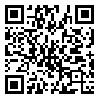Volume 16 - ویژه نامه کاربست طرح های دو گروه اخلاق و آموزش پزشکی
IJMEHM 2023, 16 - ویژه نامه کاربست طرح های دو گروه اخلاق و آموزش پزشکی: 74-92 |
Back to browse issues page
Download citation:
BibTeX | RIS | EndNote | Medlars | ProCite | Reference Manager | RefWorks
Send citation to:



BibTeX | RIS | EndNote | Medlars | ProCite | Reference Manager | RefWorks
Send citation to:
Jorjani M, Amini M, Kohan N, Sajjadi S S, Isazadeh N, Habibi A, et al . Zooming in on factors influencing the effectiveness of teaching general courses in the medical curriculum in the Islamic Republic of Iran. IJMEHM 2023; 16 (S1) : 7
URL: http://ijme.tums.ac.ir/article-1-6663-en.html
URL: http://ijme.tums.ac.ir/article-1-6663-en.html
Masoumeh Jorjani * 
 1, Mitra Amini2
1, Mitra Amini2 
 , Noushin Kohan3
, Noushin Kohan3 
 , Seyyed Samad Sajjadi4
, Seyyed Samad Sajjadi4 
 , Nikzad Isazadeh5
, Nikzad Isazadeh5 
 , Amin Habibi3
, Amin Habibi3 
 , Maryam Sohanaki5
, Maryam Sohanaki5 
 , Pouria Kanani6
, Pouria Kanani6 
 , Reza Mortazavi7
, Reza Mortazavi7 


 1, Mitra Amini2
1, Mitra Amini2 
 , Noushin Kohan3
, Noushin Kohan3 
 , Seyyed Samad Sajjadi4
, Seyyed Samad Sajjadi4 
 , Nikzad Isazadeh5
, Nikzad Isazadeh5 
 , Amin Habibi3
, Amin Habibi3 
 , Maryam Sohanaki5
, Maryam Sohanaki5 
 , Pouria Kanani6
, Pouria Kanani6 
 , Reza Mortazavi7
, Reza Mortazavi7 

1- Department of Pharmacology, School of Medicine, Shahid Beheshti University of Medical Sciences, Tehran, IRAN
2- Department of Community Medicine, School of Medicine & Clinical Education Research Center, Shiraz University of Medical Sciences, Tehran, IRAN
3- Department of Medical Education, Smart University of Medical Sciences, Tehran, IRAN.
4- Department of Foreign Languages Education, School of Allied Medical Sciences, Shahid Beheshti University of Medical Sciences, Tehran, IRAN
5- Department of Islamic Education, Research Center of Quran, Hadith and Medicine, Tehran University of Medical Sciences, Tehran, IRAN
6- Medical Student, School of Medicine, Shahid Beheshti University of Medical Sciences, Tehran, IRAN
7- Expert of Supreme Medical Planning Council,, Ministry of Health and Medical Education, Tehran, IRAN
2- Department of Community Medicine, School of Medicine & Clinical Education Research Center, Shiraz University of Medical Sciences, Tehran, IRAN
3- Department of Medical Education, Smart University of Medical Sciences, Tehran, IRAN.
4- Department of Foreign Languages Education, School of Allied Medical Sciences, Shahid Beheshti University of Medical Sciences, Tehran, IRAN
5- Department of Islamic Education, Research Center of Quran, Hadith and Medicine, Tehran University of Medical Sciences, Tehran, IRAN
6- Medical Student, School of Medicine, Shahid Beheshti University of Medical Sciences, Tehran, IRAN
7- Expert of Supreme Medical Planning Council,, Ministry of Health and Medical Education, Tehran, IRAN
Abstract: (649 Views)
General courses can effectively empower students and enhance their professional and social personality, and it is essential to continuously evaluate the effectiveness, status, and updating of these courses. Accordingly, the present study aimed to investigate the factors influencing the effectiveness of teaching general courses in the medical curriculum in Iran. The study involved both qualitative and quantitative phases. After conducting semi-structured interviews with experts, medical students, and professors of general courses, and using Braun and Clarke’s thematic analysis method, 528 codes were extracted and classified into 4 themes, 11 categories, and 33 subcategories. The main themes included updating the curriculum, focusing on effective and purposeful learning, collaboration and needs assessment of the stakeholders, and linking general courses with practical skills. Based on the results of the qualitative phase, a model for the effective teaching of general courses was developed using Delphi method with subject matter experts, and the validity of the model was confirmed with a two-round validation process. Removing unnecessary courses or those with repetitive content, designing needs-oriented content, involving experts in course revisions, using skill-based education methods, increasing skill-based and practical courses, flexibility in evaluation, and utilizing new educational technologies indicated the highest mean and consensus index. The results showed the necessity of evolving the traditional education system, rethinking, revising the topics and content, focusing on skills based on new needs, promoting evaluation models, and utilizing modern tools and technologies in teaching general courses.
Article number: 7
Type of Study: Research |
Subject:
Ethics in Medical Education
Received: 2024/01/9 | Accepted: 2023/11/22 | Published: 2023/11/22
Received: 2024/01/9 | Accepted: 2023/11/22 | Published: 2023/11/22
| Rights and permissions | |
 |
This work is licensed under a Creative Commons Attribution-NonCommercial 4.0 International License. |



